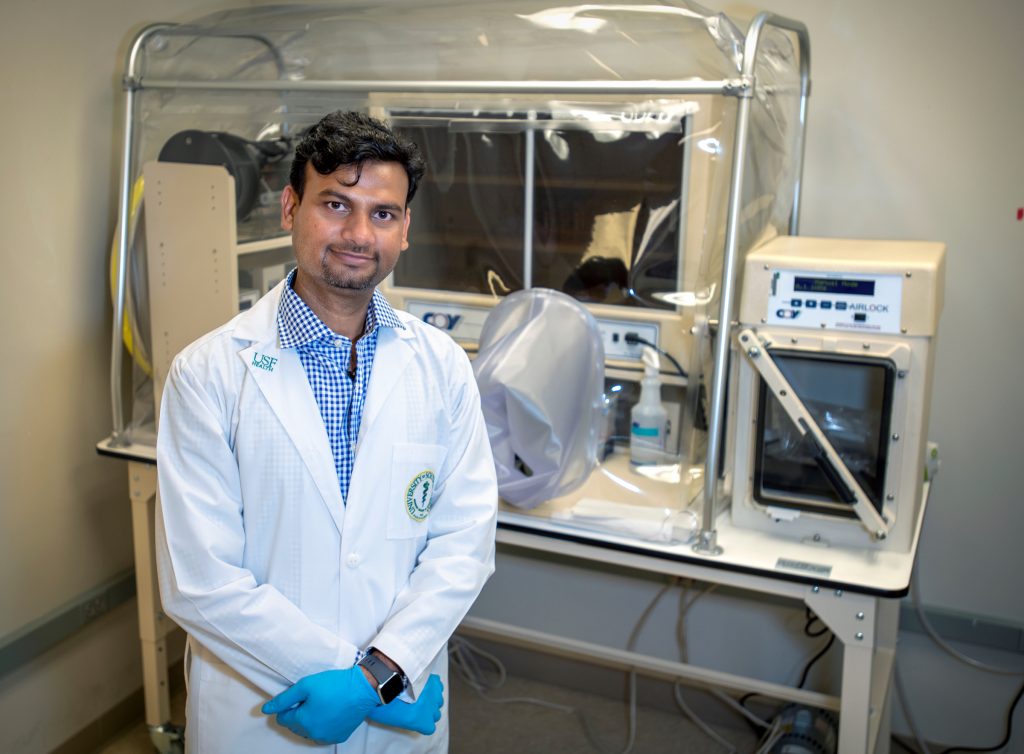USF Health microbiome expert Hariom Yadav, PhD, has received a grant from the National Institute on Aging to help determine if a common medication can restore microbiome diversity in older patients who have a form of heart failure and, thus, prevent the subsequent problems that tend keep these patients inactive and cause their conditions to worsen.

Hariom Yadav, PhD, was recently recruited to lead the USF Microbiome Research Center and his research focuses on the gut-brain connection (gut-brain axis) in relation to cognitive function.
Dr. Yadav, associate professor in the Division of Digestive Diseases and Nutrition for the Department of Neurosurgery and Brain Repair and Internal Medicine in the USF Health Morsani College of Medicine and director of the USF Center for Microbiome Research in the Microbiomes Institute, is a co-principal investigator and is working with co-principal investigator and project lead Dalane Kitzman, MD, at Wake Forest University in Winston-Salem, North Carolina.
The 3-year NIH consortium project research, which will include patients diagnosed with heart failure with preserved ejection fraction (HFpEF), is titled “Repurposing of Metformin for Older Patients with HFpEF.”
Preclinical studies show that gut barriers, including mucin production, are reduced in older gut and cause ‘leaky gut’, which allows certain antigens to diffuse into blood circulation, thus causing systemic inflammation. Preliminary data also suggest that older HFpEF patients have markedly reduced microbiome diversity, including reduced production of beneficial metabolites such as butyrate, which maintain health and gut wall integrity, and may help reduce leaky gut.

Metformin prescription bottle. Metformin is a generic medication name and label was created by photographer.
Metformin is a generic FDA-approved medication used for diabetes. Earlier studies, including research in Dr. Yadav’s lab, shows that metformin decreases leaky gut by improving microbial diversity and increasing intestinal wall mucin production thereby reducing systemic inflammation and improving physical function in lab model studies.
This new study seeks to translate these findings to determine if metformin improves microbiome diversity, reduces leaky gut, and reduces the inflammation associated with HFpEF in patients, a common condition in older people, particular older women.
“Earlier research suggests that metformin can inhibit a root cause of systemic inflammation – leaky gut – and its adverse consequences which are highly relevant to HFpEF, including exercise intolerance, a known barrier for HFpEF patients for staying active,” Dr. Yadav said. “We propose to test repurposing of metformin, a promising medication for improving heart failure outcomes by improving gut leakiness and microbial diversity, and that metformin will restore gut microbiome diversity and increase gut wall mucin, which in turn will reduce leaky gut and systemic inflammation and improve physical function for HFpEF patients.”
This new study is a randomized, blinded, placebo-controlled trial over 20 weeks in 80 non-diabetic HFpEF patients age 60 and older. The Wake Forest and Atrium Health team will coordinate the patients, measuring physical function, provide a quality of life questionnaire, and collect stool and blood samples. The team in Dr. Yadav’s lab will examine the samples and measure microbiome diversity and the key markers of leaky gut and of inflammation.
This study is supported by the National Institute on Aging of the National Institutes of Health under Award Number U01AG076928.
Dr. Yadav is conducting similar research associated with leaky gut and inflammation, including their connections to Alzheimer’s disease and other related dementias.
